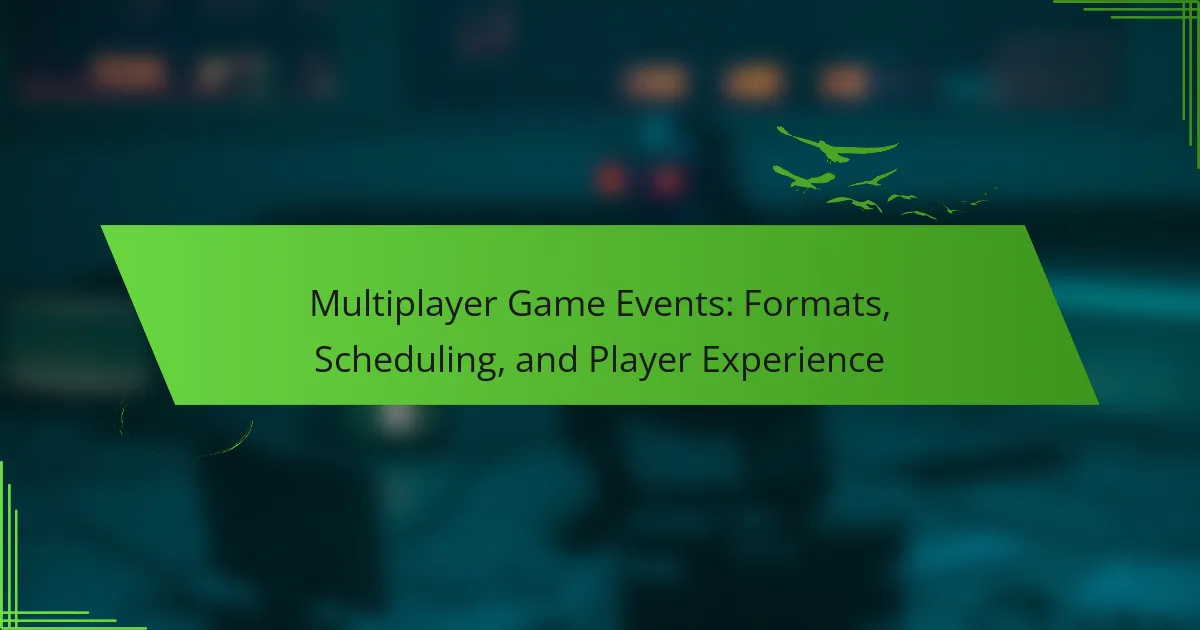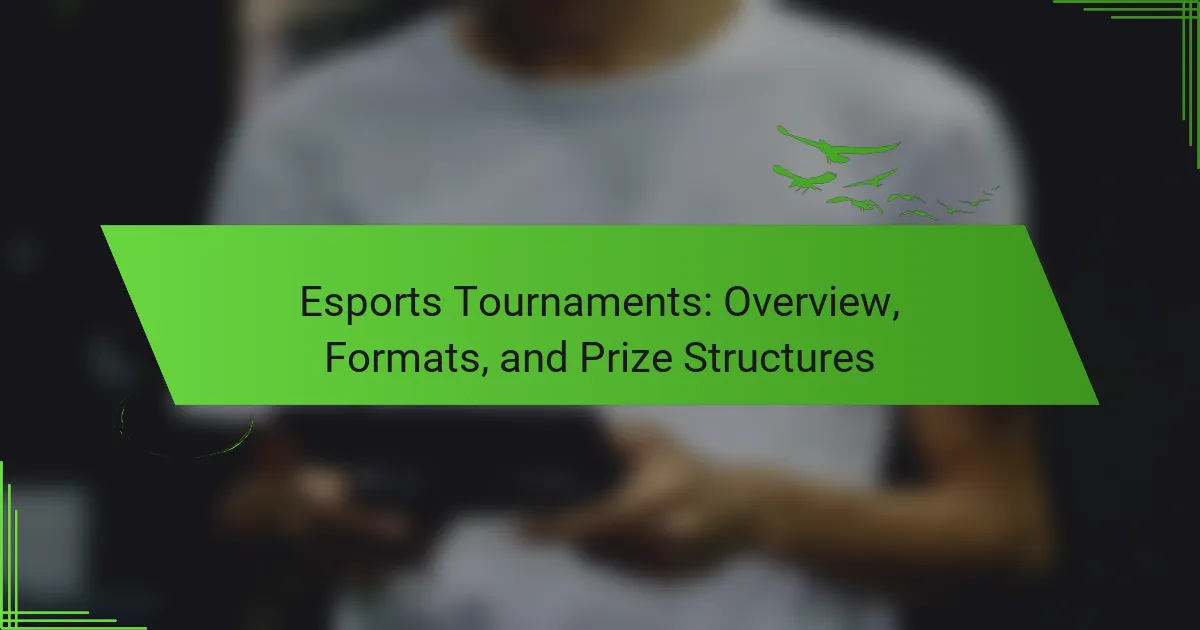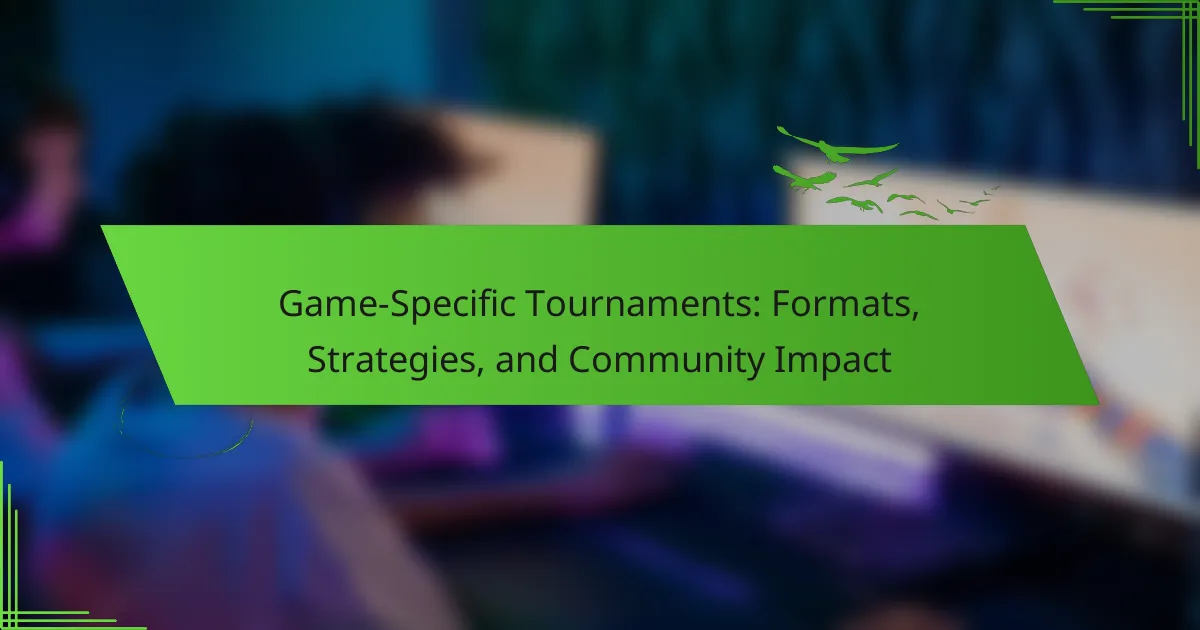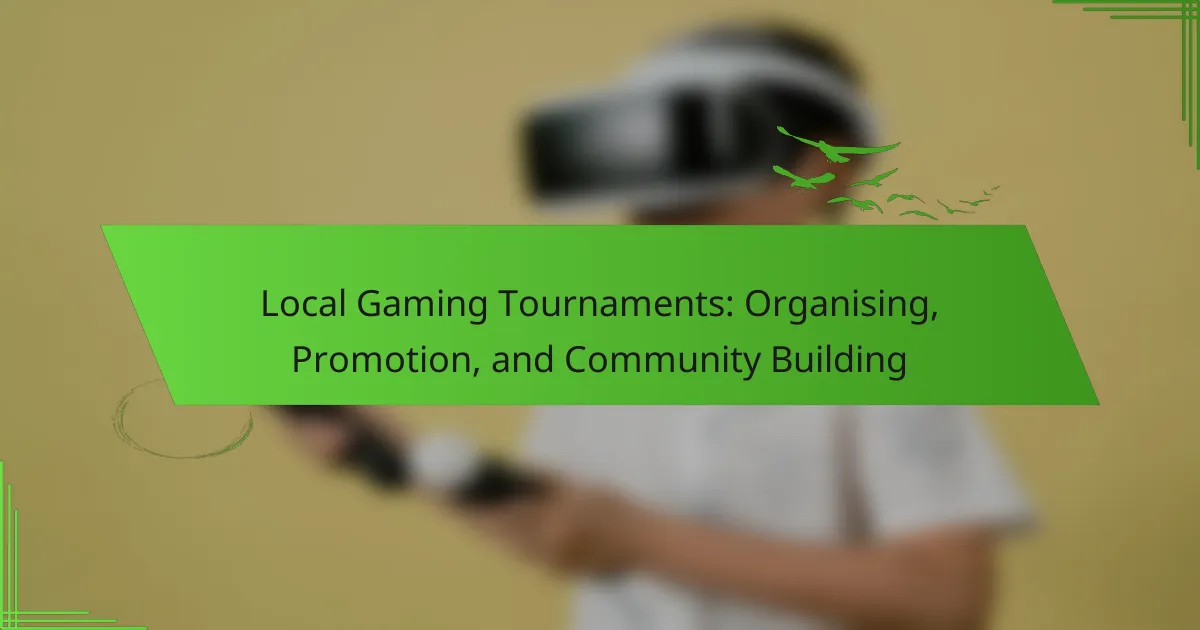Multiplayer game events enhance player engagement and foster community interaction. Explore various formats like tournaments and cooperative missions, learn about effective scheduling strategies, and understand how player experience shapes these events. Discover key attributes that make multiplayer events memorable and impactful.
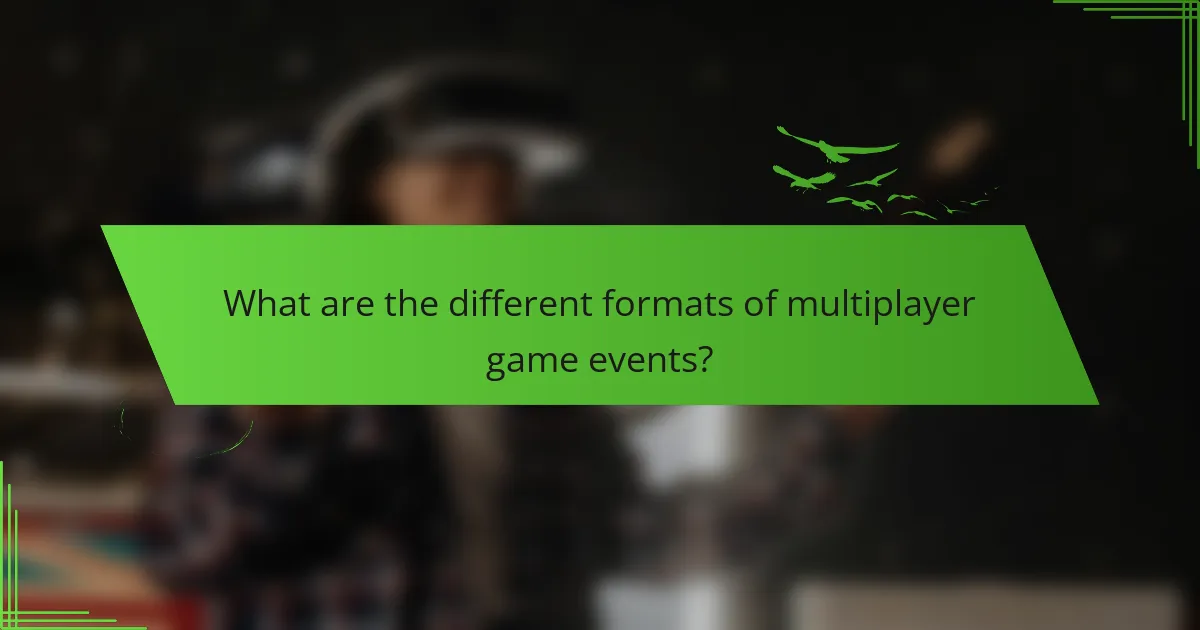
What are the different formats of multiplayer game events?
Multiplayer game events can occur in various formats, each enhancing player engagement. Common formats include tournaments, leagues, cooperative events, and special challenges. Tournaments feature competitive play with structured brackets, while leagues allow for ongoing competition over time. Cooperative events emphasize teamwork, and special challenges often introduce unique gameplay elements. Each format caters to different player preferences, promoting diverse experiences within the multiplayer gaming community.
How do competitive formats influence player engagement?
Competitive formats significantly enhance player engagement by fostering a sense of challenge and community. These formats, such as tournaments or leagues, create structured environments where players can showcase their skills. The competitive nature encourages players to invest time and effort, increasing their overall enjoyment and commitment to the game.
Different formats cater to various player preferences, from casual competitions to high-stakes events. For example, tournaments often feature brackets and elimination rounds, promoting excitement and suspense. This structure can lead to higher player retention and participation rates.
Scheduling also plays a crucial role in player engagement. Regularly scheduled events allow players to plan their participation, creating anticipation and routine. As a result, players are more likely to engage consistently, boosting the game’s community aspect.
Finally, unique attributes of competitive formats, such as rewards and recognition, further motivate players. Achievements and leaderboards provide tangible goals, enhancing the overall player experience and fostering a vibrant gaming community.
What are the benefits of cooperative formats in multiplayer events?
Cooperative formats in multiplayer events enhance teamwork, engagement, and overall player satisfaction. They foster collaboration, allowing players to strategize together, which leads to improved communication skills. Additionally, these formats often create a more inclusive environment, accommodating various skill levels. This inclusivity can result in higher retention rates, as players feel more connected and valued within the community.
Which hybrid formats are gaining popularity in 2025?
Hybrid formats gaining popularity in 2025 include online tournaments, live-streamed events, and mixed reality competitions. These formats enhance player engagement and broaden audience reach. The integration of virtual and physical elements creates immersive experiences. As a result, players enjoy diverse interactions and competitive dynamics.
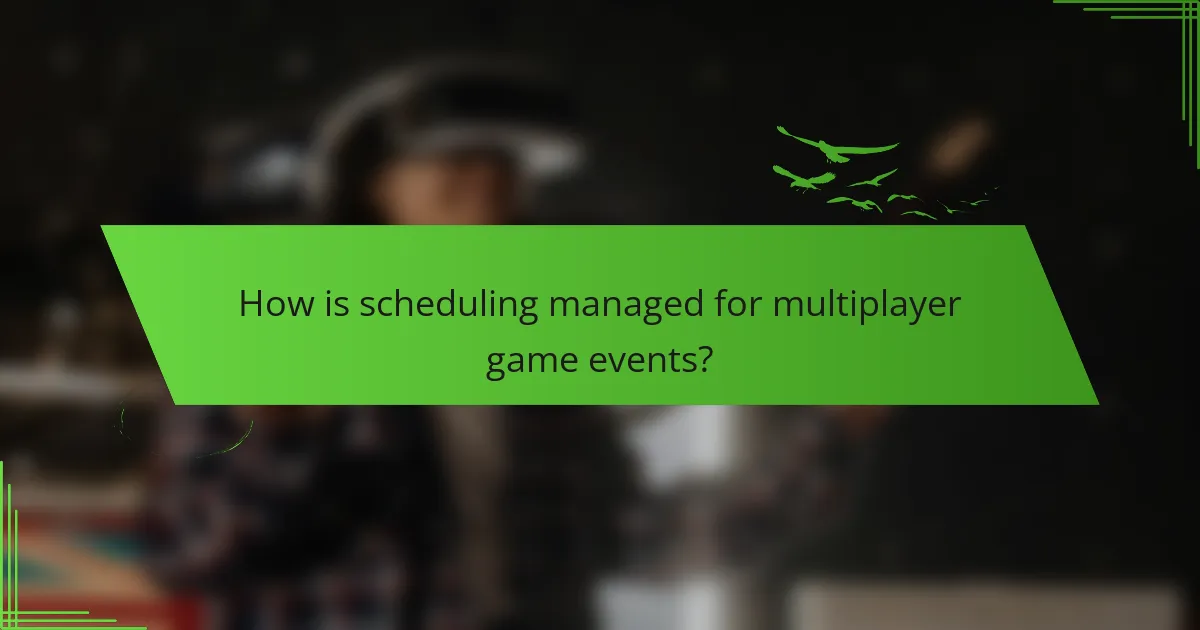
How is scheduling managed for multiplayer game events?
Scheduling for multiplayer game events is managed through a combination of player availability, event formats, and game mechanics. Developers analyze player data to determine peak times for participation.
Events often feature different formats, such as tournaments, cooperative missions, or seasonal challenges, which influence scheduling. Developers also consider time zones to ensure global participation.
Communication is key; players receive notifications and reminders through in-game messaging or external platforms. This enhances player engagement and ensures they are aware of upcoming events.
Finally, flexibility in scheduling allows developers to adjust based on player feedback and participation rates, optimizing the overall experience.
What factors influence the timing of these events?
The timing of multiplayer game events is influenced by player availability, game development schedules, and seasonal trends. Player engagement peaks during weekends and holidays, while developers often align events with game updates or promotional campaigns. Additionally, seasonal events can enhance player experience by tapping into cultural celebrations.
How do time zone differences affect player participation?
Time zone differences significantly affect player participation in multiplayer game events. They can lead to scheduling conflicts, reducing attendance and engagement. Players in varying time zones may find it challenging to participate at designated times, impacting overall event success. For example, a game event scheduled in the evening for one region may occur in the early morning for another, discouraging participation. Optimal scheduling considers global player distribution to maximize involvement and enhance the player experience.
What are the best practices for event scheduling to maximize attendance?
To maximize attendance at multiplayer game events, prioritize scheduling during peak gaming hours. Consider player demographics and time zones to optimize participation. Utilize social media and in-game announcements for promotion. Offer incentives, such as exclusive rewards, to encourage attendance.
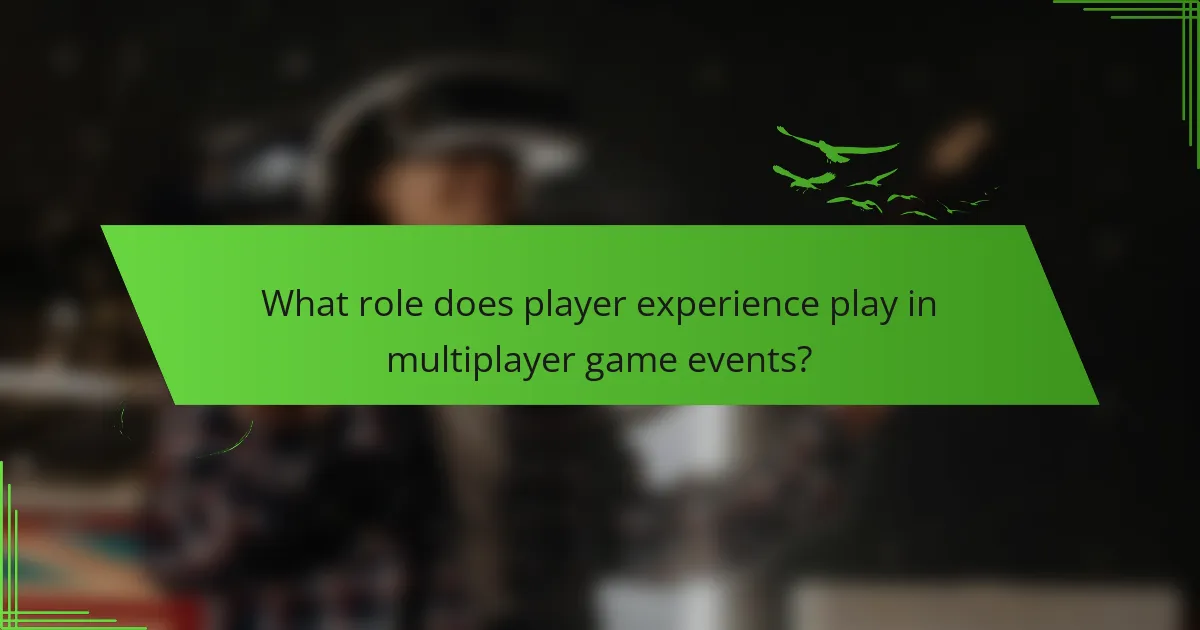
What role does player experience play in multiplayer game events?
Player experience significantly influences the success of multiplayer game events. Engaging players fosters a sense of community, enhances competition, and encourages participation. Positive experiences lead to higher retention rates and increased player satisfaction. Additionally, tailored experiences, such as personalized rewards and interactive features, can elevate the overall enjoyment of events. Ultimately, prioritizing player experience is essential for creating memorable and impactful multiplayer game events.
How can game developers enhance the player experience during events?
Game developers can enhance player experience during events by implementing engaging formats, strategic scheduling, and interactive features. Diverse event formats, such as tournaments or cooperative challenges, cater to different player preferences. Effective scheduling ensures peak participation, considering time zones and player availability. Additionally, incorporating real-time feedback mechanisms and rewards increases player engagement and satisfaction.
What are common challenges players face in multiplayer events?
Players in multiplayer events often face challenges such as connectivity issues, team coordination difficulties, and varying skill levels. These obstacles can hinder overall performance and enjoyment.
Connectivity issues can lead to lag or disconnections, affecting gameplay. Team coordination difficulties arise when players struggle to communicate effectively, leading to misaligned strategies. Additionally, varying skill levels among participants can create imbalances, resulting in frustration for less experienced players.
Understanding these common challenges can help organizers improve event structure and enhance player experience.
How do community feedback mechanisms improve future events?
Community feedback mechanisms enhance future multiplayer game events by providing valuable insights into player preferences and experiences. This feedback helps developers identify strengths and weaknesses in event formats and scheduling. As a result, they can make informed adjustments that improve player engagement and satisfaction. For example, analyzing player feedback on event duration can lead to optimized schedules that better fit player availability. Additionally, incorporating player suggestions for new features can lead to unique event offerings that enhance the overall gaming experience.
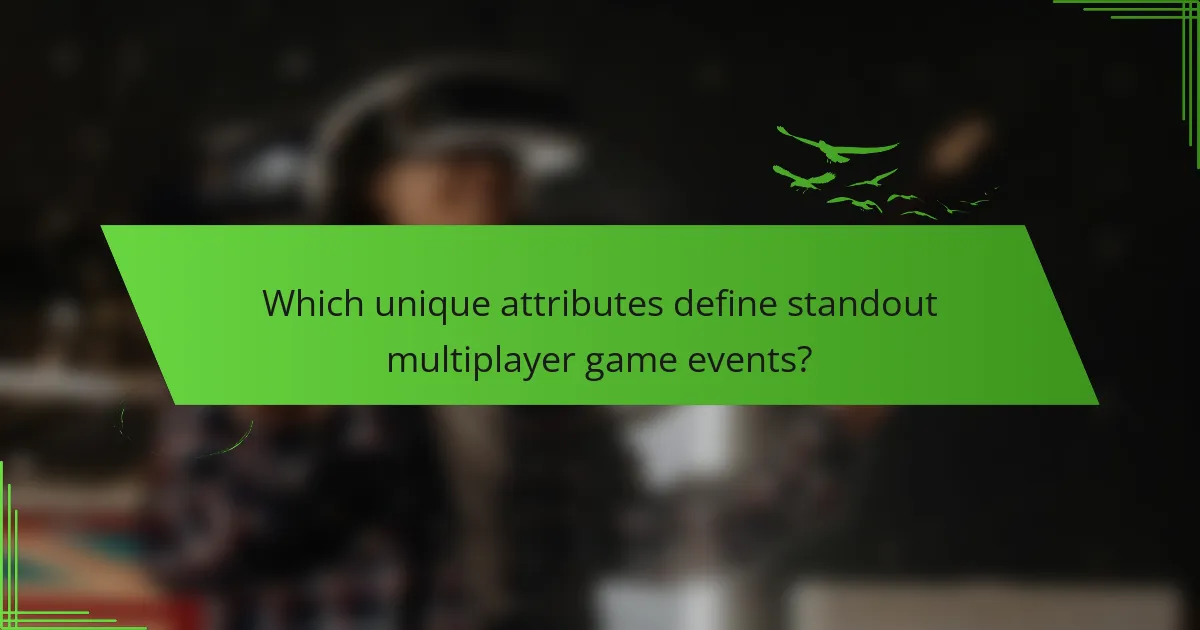
Which unique attributes define standout multiplayer game events?
Unique attributes that define standout multiplayer game events include innovative formats, engaging player interactions, and strategic scheduling. These elements enhance player experience and foster community engagement. Innovative formats, such as battle royale or cooperative challenges, offer fresh gameplay dynamics. Engaging player interactions, like live commentary and social media integration, create a vibrant atmosphere. Strategic scheduling ensures optimal participation, often aligning with player availability and peak gaming times.
What innovative technologies are being integrated into events in 2025?
In 2025, innovative technologies enhancing multiplayer game events include augmented reality, virtual reality, and AI-driven matchmaking. These technologies improve player engagement and create immersive experiences. Augmented reality allows players to interact with real-world environments, while virtual reality provides fully immersive gameplay. AI-driven matchmaking optimizes player pairings based on skill levels, enhancing competition and enjoyment. These advancements are reshaping the multiplayer gaming landscape.
How do exclusive in-game rewards impact player motivation?
Exclusive in-game rewards significantly enhance player motivation by providing unique incentives for participation. These rewards create a sense of achievement and exclusivity, encouraging players to engage more actively in multiplayer game events. For instance, limited-time rewards can drive urgency, prompting players to log in frequently and complete challenges.
Moreover, exclusive rewards often foster competition among players, as they strive to attain items or status that few possess. This competitive aspect can lead to increased social interaction within the game, enhancing the overall player experience. As a result, players may feel more invested in the game, leading to longer play sessions and higher retention rates.
In summary, exclusive in-game rewards effectively boost player motivation by creating urgency, fostering competition, and enhancing social interactions.
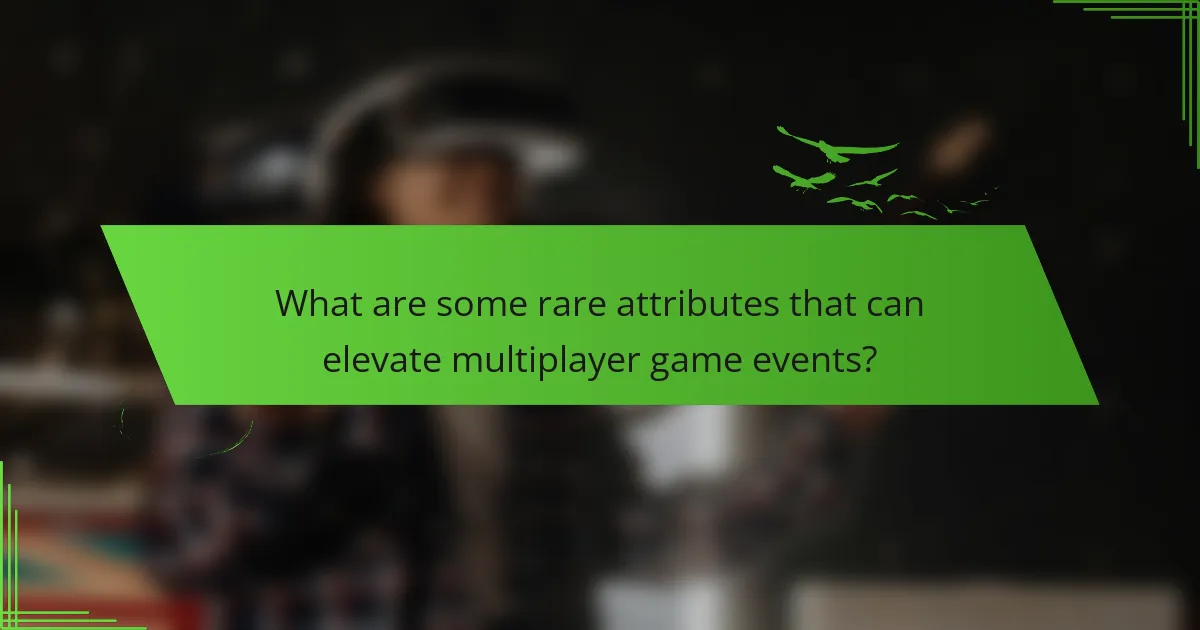
What are some rare attributes that can elevate multiplayer game events?
Rare attributes that can elevate multiplayer game events include exclusive in-game rewards, unique event-themed gameplay mechanics, limited-time collaborations with popular franchises, specialized matchmaking algorithms for enhanced competition, immersive live events with real-time player interaction, and community-driven content creation opportunities. These elements foster engagement and excitement among players.
How do cultural themes influence event design and player engagement?
Cultural themes significantly shape event design and enhance player engagement in multiplayer games. These themes create immersive experiences that resonate with players’ backgrounds and interests.
Incorporating cultural elements, such as traditional festivals or folklore, can attract diverse audiences. Events designed around these themes often include themed challenges, unique rewards, and culturally relevant narratives.
Moreover, understanding cultural preferences helps developers schedule events at optimal times for maximum participation. For instance, aligning events with local holidays can boost engagement.
Finally, cultural themes foster community building, as players connect over shared experiences and values. This connection enhances player retention and loyalty to the game.
What are the effects of celebrity involvement in multiplayer events?
Celebrity involvement in multiplayer events significantly enhances player engagement and boosts event visibility. Their presence can attract larger audiences, create excitement, and foster community interaction. For example, high-profile streamers can elevate the overall experience, leading to increased participation and revenue. Additionally, celebrity endorsements often result in heightened brand loyalty among fans.
How can environmental sustainability be integrated into event planning?
Integrating environmental sustainability into event planning involves adopting eco-friendly practices throughout the process. Event planners can minimize waste by using digital tickets and promoting recycling initiatives.
Incorporating local vendors reduces carbon footprints associated with transportation. Additionally, selecting venues with sustainable certifications ensures responsible resource use.
Promoting public transportation and carpooling options encourages reduced vehicle emissions. Finally, measuring the event’s carbon footprint can help in setting future sustainability goals.
What are the best practices for optimizing multiplayer game events for success?
To optimize multiplayer game events for success, focus on engaging formats, strategic scheduling, and enhancing player experience.
Engaging formats include tournaments, cooperative challenges, and seasonal events, which foster competition and community. Strategic scheduling ensures events do not conflict with other gaming activities, maximizing participation. Enhancing player experience involves clear communication, rewarding participation, and providing a balanced gameplay environment.
Collectively, these practices create a vibrant, engaging atmosphere that encourages player retention and satisfaction.
